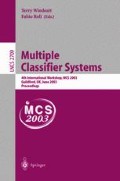Abstract
In recent work, we introduced a generalization of ECOC learning under the theory of recursive error correcting codes. We named it RECOC (Recursive ECOC) learning. If long output codewords are allowed, as in the case of problems involving a large number of classes, standard recursive codes such as LDPC or Turbo can be used. However, if the number of classes is moderated, neither good LDPC nor Turbo codes might exist due to the small block lengths involved. In this paper, RECOC learning based on the recently introduced ensemble of Product Accumulated codes is analyzed. Due to their native data storage oriented design, smaller block lengths are allowed. In addition, because of their simplicity, all key concepts regarding RECOC learning can be easily explained.
Access this chapter
Tax calculation will be finalised at checkout
Purchases are for personal use only
Preview
Unable to display preview. Download preview PDF.
References
James, G., Hastie, T.: The error coding method and PiCTs. Journal of Computational and Graphical Statistics, 7:3:377–387 (1997)
Dietterich, T., Bakiri, G.: Error-correcting output codes: A general method for improving multiclass inductive learning programs. Proceedings of the Ninth National Conference on Artificial Intelligence (AAAI-91), pp. 572–577, Anaheim, CA: AAAI Press (1991)
Crammer, K., Singer, Y.: On the Learnability and Design of Output Codes for Multiclass Problems. 35–46. Nicolò Cesa-Bianchi, Sally A. Goldman (Eds.): Proceedings of the Thirteenth Annual Conference on Computational Learning Theory (COLT 2000), pp. 35–46, Palo Alto, California. Morgan Kaufmann (2000)
Kong, E., Dietterich, T.: Error-correcting output coding corrects bias and variance. In Proceedings of the 12 th International Conference on Machine Learning, pp. 313–321, (1995)
Allwein, E., Schapire, R., Singer, Y.: Reducing Multiclass to Binary: A Unifying Approach for Margin Classifiers. Journal of Machine Learning Research 1, pp. 113–141 (2000)
Guruswami, V., Sahai, A.: Multiclass Learning, Boosting, and Error-Correcting Codes. Proceedings of the Twelfth Annual Conference on Computational Learning Theory (COLT 99), pp. 145–155, Santa Cruz, CA, USA (1999)
Tapia, E., González, J.C., García Villalba, J., Villena, J.: Recursive Adaptive ECOC models. Proceedings of the 10th Portuguese Conference on Artificial Intelligence, EPIA 2001. Springer Lecture Notes in Artificial Intelligence, LNAI 2258, Oporto, Portugal (2001)
Tapia, E., González, J.C., García Villalba, J.: Recursive Classifiers. Proceedings of the 2002 IEEE International Symposium on Information Theory ISIT 2002, Lausanne, Switzerland (2002)
Tanner, M.: A recursive Approach to Low Complexity Error Correcting Codes. IEEE Transactions on Information Theory, Vol. IT-27, pp. 533–547 (1981)
Richardson, T., Urbanke, R.: The Capacity of Low Density Parity Check Codes under Message Passing Decoding. IEEE Transactions on Information Theory, Vol. 47, No. 2, pp. 599–618 (2001)
Benedetto S., Montorsi G.: Unveiling Turbo Codes: Some Results on Parallel Concatenated Coding Schemes. IEEE Transactions on Information Theory, Vol. 42, No. 2, pp. 409–428, (1996)
Li, J., Narayanan K. R., Georghiades C. N.: Product Accumulate Codes: A class of Capacity-Approaching, Low Complexity Codes. Department of Electrical Engineering, Texas
A&M University. Submitted (2001) IEEE Transactions on Information Theory. http://ee.tamu.edu/~jingli/pub/paper/IT_1.pdf
Kschischang, F., Frey, B.: Iterative decoding of compound codes by probability propagation in graphical models. IEEE Journal on Selected Areas in Communications, Vol. 16-2, pp. 219–230 (1998)
Wiberg, N.: Codes and Decoding on General Graphs. Doctoral Dissertation, Department of Electrical Engineering, Linköping University, Sweden (1996)
Csiszár, I., Körner J.: Information Theory: Coding Theorems for Discrete Memoryless Systems. Academic Press, Inc. (London) LTD (1981)
Berrou, C., Glavieux, A.: Near Optimum Error Correcting Coding and Decoding: Turbo Codes. IEEE Transactions on Communications, Vol. 44, No. 10, pp. 1261–1271 (1996)
McEliece, R. J., MacKay, D. J.: Turbo Decoding as an Instance of Pearl’s Belief Propagation Algorithm. IEEE Journal on Selected Areas in Communications, Vol. 16, No. 2, pp. 140–152 (1998)
Weiss, Y.: Belief propagation and revision in networks with loops. Technical Report 1616, MIT AI lab (1997)
Schapire, R. E., Singer, Y.: Improved Boosting Algorithms Using Confidence-rated Predictions. Machine Learning, Vol. 37, No. 3, pp. 277–296 (1999)
Sason, I., Shamai, S.: Improved Upper bounds on the ML decoding error probability of parallel and serial concatenated turbo codes via their ensemble distance spectrum. IEEE Trans. on Information Theory, Vol. 46, No. 1, pp. 24–47 (2000)
Witten, I., Frank E.: Data Mining, Practical Machine Learning Tools and Techniques with JAVA Implementations. Morgan Kaufmann Publishers, San Francisco, California (2000)
Blaum M., Fan J. L., Xu L.: Soft Decoding of Several Classes of Array Codes. Proceedings of the 2002 IEEE International Symposium on Information Theory ISIT 2002, Lausanne, Switzerland (2002)
Kell, D. B., King, R. D.: On the optimization of classes for the assignment of unidentified reading frames in functional genomics programs: the need for machine learning. Trends in Biotechnology 18, pp. 93–98 (2000)
Author information
Authors and Affiliations
Editor information
Editors and Affiliations
Rights and permissions
Copyright information
© 2003 Springer-Verlag Berlin Heidelberg
About this paper
Cite this paper
Tapia, E., González, J.C., García-Villalba, J. (2003). Good Error Correcting Output Codes for Adaptive Multiclass Learning. In: Windeatt, T., Roli, F. (eds) Multiple Classifier Systems. MCS 2003. Lecture Notes in Computer Science, vol 2709. Springer, Berlin, Heidelberg. https://doi.org/10.1007/3-540-44938-8_16
Download citation
DOI: https://doi.org/10.1007/3-540-44938-8_16
Published:
Publisher Name: Springer, Berlin, Heidelberg
Print ISBN: 978-3-540-40369-2
Online ISBN: 978-3-540-44938-6
eBook Packages: Springer Book Archive

